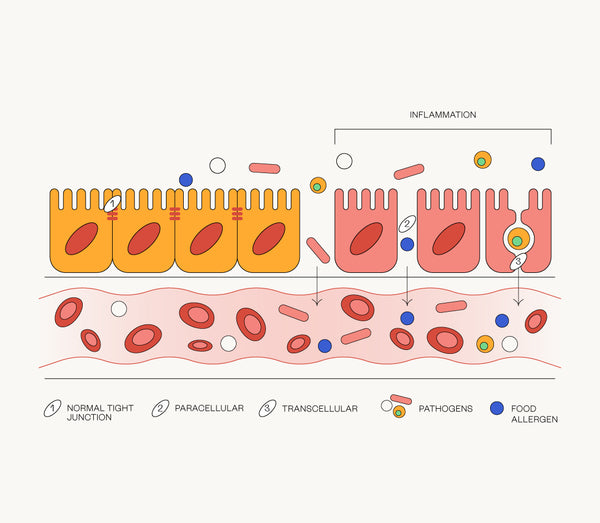Why should I care about the gut-brain axis?
The gut-brain axis is the communication pathway between these two vital organs. It means that the environment of one organ can affect the function, activity or environment of the other.
It offers some explanation as to why we get butterflies in our stomach when we’re nervous or why an imbalanced gut microbiome can cause anxiety or depression.
It’s all clever stuff. In this third and final instalment, we look at why you should pay attention to your gut-brain axis even if you’re healthy and what you can do to strengthen it.

I'm healthy, why should I worry about my gut-brain axis?
The activity of your gut microbiome is felt throughout the body, not just in the colon. In fact, it’s often referred to as the second brain, that’s how important this micro-ecosystem is to your health.
Gut bacteria are amazing. They help to transform some of the food you eat into mystical metabolites which directly and positively impact your health. Plus, they have an amazing ability to communicate with the central nervous system and brain, influencing your moods and emotions.
However, a dysbiotic gut is not good for your colonic, mental or even general health. There are a variety of factors that can contribute to dysbiosis, like changes to diet, stress, and taking antibiotics. Ultimately, resulting in the gut lining becoming more permeable and enabling the gut contents to cross into the bloodstream [1].
And you may not realise it, but these chemical messages carried via the nervous system or pathogens and toxins in the blood to the brain can influence your mood, emotions and stress levels.
That’s why you should care about your gut-brain axis. It’s not just a bi-directional communication passageway but a gateway to your health and wellbeing.
What can I do to help strengthen my gut-brain connection?
If your gut microbiome can be altered negatively, then the same is true the other way around. That’s what makes it so complex and fascinating. You can take care of your own microbiome’s destiny!

A simple way to effectively manipulate your microbiome is through your diet. Don’t forget that what you eat has a great impact on your gut microbial buddies. So, by improving your diet, you’ll be promoting the composition and activities of your microbiota.
Prebiotics are types of dietary fibre which help to keep your gut microbes well-nourished and enhance their superpower activities [2]. Although it sounds fancy, there are many foods which are naturally prebiotic, such as:
- apples
- asparagus
- bananas
- barley
- chicory root
- cocoa
- flaxseeds
- garlic
- Jerusalem artichokes
- oats
- onions
Don’t confuse prebiotics with probiotics, though. Probiotics are live microorganisms that, when you consume in large enough quantities, will provide you with health benefits [3]. Probiotics that benefit mental health and wellbeing are called psychobiotics [4].Prebiotics, on the other hand, are food that your gut bacteria need to thrive.
Research shows that probiotics can have a significant effect on depression and anxiety [5]. One study published in 2017, found that a probiotic strain, Bifidobacterium longum NCC3001 reduced depression and improved quality of life in patients with irritable bowel syndrome [6].
Want to know more about all things prebiotic, probiotic and synbiotic? Check our Food, prebiotics and microbiome page here.
And you’ll be pleased to hear that Innate Co’s Daily Synbiotic contains 8 probiotic bacterial strains, including B. longum, all of which support your digestive health as well as your overall health, by contributing to strengthening the gut lining. Why not get yours today?
Disclaimer: Just to be clear, we cannot promise you anything. This blog is not intended to be medical advice. Instead, we want to equip you with the tools to create the best version of yourself, including for your best possible gut health to nurture your brain and beyond.
Conclusion
There’s no denying that the gut-brain axis sounds and is complex, but the important thing to remember is it is a unique communication pathway between your gut and brain. Both organs are able to have a chat together via part of the vagus nerve, the longest cranial nerve in the body, as well as hormones called neurotransmitters.
Your gut microbiome plays a huge part in the gut-brain axis. Gut bacteria produce metabolites which help to strengthen the intestinal barrier. In effect, the stronger the barrier, the healthier you will be. That’s because toxins and pathogens will be unable to enter the blood and cause harm.
An imbalanced gut microbiome has been linked to mental health conditions as well as neurodegenerative disorders. The good news is you can take care of your gut and boost your mental health by eating a balanced diet rich in prebiotic fibre and probiotics.
Sources
[1] Clapp, M et al. Gut Microbiota’s Effect on Mental Health: The Gut-Brain Axis. Clinics & Practice 7. (2017)
[2] Davani-Davari, D et al. Prebiotics: Definition, Types, Sources, Mechanisms, and Clinical Applications. Foods 8. https://doi.org/10.3390/foods8030092 (2019)
[3] Kerry, R, G et al. Benefaction of probiotics for human health: A review. Journal of Food & Drug Analysis 26. https://doi.org/10.1016/j.jfda.2018.01.002 (2018)
[4] Dinan, T, G., Stanton, C & Cryan, J, F. Psychobiotics: a novel class of psychotropic. Biol Psychiatry 15. doi: 10.1016/j.biopsych.2013.05.001. (2013)
[5] Liu, R, T., Walsh, R, F, L & Sheehan, A, E. Prebiotics and probiotics for depression and anxiety: a systematic review and meta-analysis of controlled clinical trials. Neurosci Biobehav Rev. 102. doi: 10.1016/j.neubiorev.2019.03.023 (2019)
[6] Pinto-Sanchez, M, I et al. Probiotic Bifidobacterium longum NCC3001 reduces depression scores and alters brain activity: a pilot study in patients with irritable bowel syndrome. Gastroenterology 153. doi: 10.1053/j.gastro.2017.05.003 (2017)


